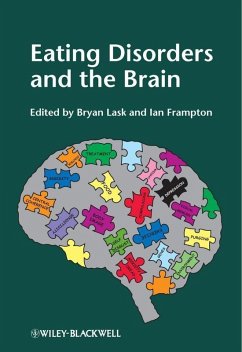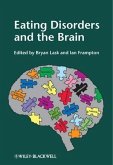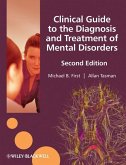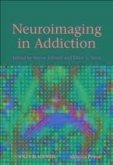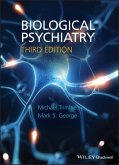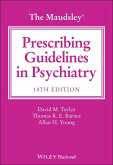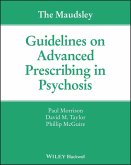Why is the brain important in eating disorders? This ground-breaking new book describes how increasingly sophisticated neuroscientific approaches are revealing much about the role of the brain in eating disorders. Even more importantly, it discusses how underlying brain abnormalities and dysfunction may contribute to the development and help in the treatment of these serious disorders. * Neuropsychological studies show impairments in specific cognitive functions, especially executive and visuo-spatial skills. * Neuroimaging studies show structural and functional abnormalities, including cortical atrophy and neural circuit abnormalities, the latter appearing to be playing a major part in the development of anorexia nervosa. * Neurochemistry studies show dysregulation within neurotransmitter systems, with effects upon the modulation of feeding, mood, anxiety, neuroendocrine control, metabolic rate, sympathetic tone and temperature. The first chapter, by an eating disorders clinician, explains the importance of a neuroscience perspective for clinicians. This is followed by an overview of the common eating disorders, then chapters on what we know of them from studies of neuroimaging, neuropsychology and neurochemistry. The mysterious phenomenon of body image disturbance is then described and explained from a neuroscience perspective. The next two chapters focus on neuroscience models of eating disorders, the first offering an overview and the second a new and comprehensive explanatory model of anorexia nervosa. The following two chapters offer a clinical perspective, with attention on the implications of a neuroscience perspective for patients and their families, the second providing details of clinical applications of neuroscience understanding. The final chapter looks to the future. This book succinctly reviews current knowledge about all these aspects of eating disorder neuroscience and explores the implications for treatment. It will be of great interest to all clinicians (psychiatrists, psychologists, nurses, dieticians, paediatricians, physicians, physiotherapists) working in eating disorders, as well as to neuroscience researchers.
Dieser Download kann aus rechtlichen Gründen nur mit Rechnungsadresse in A, B, BG, CY, CZ, D, DK, EW, E, FIN, F, GR, HR, H, IRL, I, LT, L, LR, M, NL, PL, P, R, S, SLO, SK ausgeliefert werden.
"Congratulation on excellent book: informative, readable, broad in its coverage, and very useful to those of us who are not neuroscientists.I particularly appreciated the several concluding chapters that articulated and evaluated the nature, strengths, and shortcomings of models."
(Dr Michael Levine, Emeritus Professor of Psychology, Kenyon College, Gambier, USA, November 2102)
"This is a very good contribution to the psychiatric literature that will help clinicians, researchers, and neuroscientists in general to understand eating disorders from a biopsychosocial perspective. It gives a very explicit definition of eating disorders as well as treatment options and future overviews." (Doody's, 25 May 2012) "Well written and well edited, nicely balanced between academic reviews and integrative theoretical syntheses, the readable chapters will inform readers who lack deep knowledge about biological aspects of eating disorders as well as those who are better informed. Chapters are scholarly without being stuffy, and contributors summarize pertinent studies in structural and functional neuroimaging, neuropsychology, and the neuroscience of body image.
For serious eating disorders clinicians as well as academicians, there's much in this book to study and ponder." - EATING DISORDERS REVIEW
"There has been an important paradigm shift in thinking about eating disorders in that the brain is receiving more attention. The Academy of Eating Disorders has published a position paper placing the brain more centrally within these highly complex multifaceted disorders. This book is an important addition to the literature: the authors are all expert communicators and are able to make the topic simple, enjoyable and easy to understand." - Janet Treasure, Professor of Psychiatry, Guy's, King's & St Thomas' Medical School, London, U
(Dr Michael Levine, Emeritus Professor of Psychology, Kenyon College, Gambier, USA, November 2102)
"This is a very good contribution to the psychiatric literature that will help clinicians, researchers, and neuroscientists in general to understand eating disorders from a biopsychosocial perspective. It gives a very explicit definition of eating disorders as well as treatment options and future overviews." (Doody's, 25 May 2012) "Well written and well edited, nicely balanced between academic reviews and integrative theoretical syntheses, the readable chapters will inform readers who lack deep knowledge about biological aspects of eating disorders as well as those who are better informed. Chapters are scholarly without being stuffy, and contributors summarize pertinent studies in structural and functional neuroimaging, neuropsychology, and the neuroscience of body image.
For serious eating disorders clinicians as well as academicians, there's much in this book to study and ponder." - EATING DISORDERS REVIEW
"There has been an important paradigm shift in thinking about eating disorders in that the brain is receiving more attention. The Academy of Eating Disorders has published a position paper placing the brain more centrally within these highly complex multifaceted disorders. This book is an important addition to the literature: the authors are all expert communicators and are able to make the topic simple, enjoyable and easy to understand." - Janet Treasure, Professor of Psychiatry, Guy's, King's & St Thomas' Medical School, London, U

